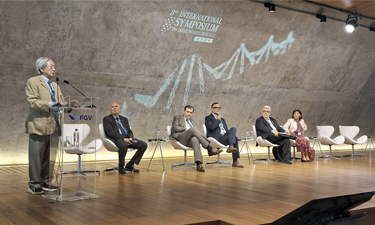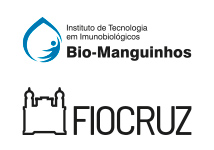 The eighth edition of the International Symposium on Immunobiologicals – ISI concluded with a look to the future that permeated the entire event and numbers that express the relevance of the Bio-Manguinhos initiative. The hybrid and free meeting lasted three days (May 8th and 10th) and brought together more than 50 countries, with 3,338 registrants and 52 speakers. In it, the final report of the Project for the Reconquest of High Vaccination Coverages was presented by the Institute's senior scientific advisor, Akira Homma. Between 2021 and 2023, the team created a collaboration network to address low vaccination coverage rates in Amapá and Paraíba. “We arrived at places where we heard people say that no one had ever been there”, he celebrated.
The eighth edition of the International Symposium on Immunobiologicals – ISI concluded with a look to the future that permeated the entire event and numbers that express the relevance of the Bio-Manguinhos initiative. The hybrid and free meeting lasted three days (May 8th and 10th) and brought together more than 50 countries, with 3,338 registrants and 52 speakers. In it, the final report of the Project for the Reconquest of High Vaccination Coverages was presented by the Institute's senior scientific advisor, Akira Homma. Between 2021 and 2023, the team created a collaboration network to address low vaccination coverage rates in Amapá and Paraíba. “We arrived at places where we heard people say that no one had ever been there”, he celebrated.
The importance of cooperation between institutions such as Bio-Manguinhos and the appreciation of policies such as the Unified Health System (SUS) for scientific development in favor of public health was highlighted in the lectures. The director of the Institute, Mauricio Zuma, celebrated the success of the edition, with people from all over the world paying attention to talks about biotechnology, research and innovation, among other diverse topics. “The results are for national public health. We will have promising solutions for our country’, he highlighted. Tedros Adhanom, director general of the World Health Organization (WHO), highlighted the relevance of Bio-Manguinhos partnerships with other countries. Representative of the Pan American Health Organization (PAHO) in Brazil, Socorro Gross reinforced the need for integration: “The region has the opportunity to form an alliance of innovation and production for health. There is a great possibility in Brazil, the greatest social protection policy we could aspire to, the SUS”.
Representing the Ministry of Health (MS), Marcelo de Matos addressed the promotion of technology transfer, development of innovative solutions and encouragement of national production. A subject that was reinforced in the speech of Mario Moreira, president of Fiocruz: “Bio-Manguinhos plays a fundamental role in balancing the Brazilian trade balance, a sector that exports and generates employment and income. We have SUS as the pivot of this development, and Bio is an example that it produces”. A consensus among the speakers was the expectation about the Institute's role in the global effort to reduce health asymmetries. One of the main factors is the fact that the institution is a PAHO/WHO hub for the production of vaccines with messenger RNA technology to serve Brazil and the region, favoring autonomy and contributing as a global actor of central strategic importance.
The world united for health
Boro Dropulić, executive director of the Caring Cross organization, presented innovative products such as CAR-T cell therapies and stem cells: “We are working on technology transfer to Brazil and all of Latin America, with Bio-Manguinhos as a reference center . We have a lot of experience and we want to share it, curing as many patients as possible.” The challenge of treating the largest number of people at the best possible cost was the topic addressed by Martín Bonamino, from INCa and Fiocruz, in “Gene therapy-based approaches to treating patients in SUS”: “More than 30 thousand patients are being treated with technology in the world, in a safe and accessible way. We will develop new treatments that we can offer to the Brazilian population.”
The panel “Arboviruses in Brazil: political and technological challenges for the fight against Dengue”, was moderated by Fiocruz researcher Margareth Dalcolmo. Eder Gatti, director of the Ministry of Health's National Immunization Program Department, presented data and measures to combat the worst epidemic of the disease in the country's history. Other speakers discussed expectations regarding the Brazilian vaccine and innovative strategies to combat the disease, such as the use of wolbachia bacteria. In “mRNA vaccines platform”, Patricia Neves, from Bio-Manguinhos, showed the project that aims to achieve equity in the availability of vaccines and products with high added value: “We are developing our capacity to be totally independent and have our own products” .
Experts also discussed public policies in science and technology with a focus on challenges such as fake news, artificial intelligence, climate change and food security, highlighting mental health as an important issue that is still neglected, but with the potential to expand access through telemedicine. The agenda included the need to communicate the importance of the vaccine, the evolution of production technologies and the legacy of the Covid-19 pandemic, including warnings about how the scientific community, industry and government should face the next pandemics. Closing the 8th ISI, the awards ceremony recognized ten works selected by the Evaluation Committee; and the Mulheres de Chico block gave a musical performance.
Text: Maria Carolina Avellar
English Version: Thais Christ
Image: Gabriella Ponte


